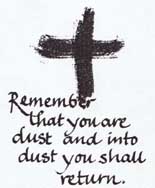

As we begin this season of Lent, we gather today to acknowledge that we are sinners.

My brothers and sisters, the hour of God's favor draws near, the day of his mercy and of our salvation approaches, when death was destroyed and eternal life began.

Blessed be God for ever.ġ663 In the following words, the minister prepares those present for the blessing and distribution of the ashes. Praised be the God of grace, mercy, and peace. The grace, the mercy, and the peace of God the Father and Christ Jesus our Savior be with you.ġ662 A lay minister greets those present in the following words: In the name of the Father, and of the Son, and of the Holy Spirit.Īll make the sign of the cross and reply:ġ661 The minister greets those present in the following or other suitable words, taken mainly from sacred Scripture. This blessing is an adaptation of the rite for the blessing and distribution of ashes on Ash Wednesday in The Roman Missal.ġ660 When the community has gathered, a suitable song may be sung. The blessing of the ashes, however, is reserved to a priest or deacon.Įndnote: 7. The homily should conclude by inviting the sick person to prepare himself or herself for the reception of the ashes.ġ659 This rite may be celebrated by a priest or deacon who may be assisted by lay ministers in the distribution of the ashes. Nevertheless, at least one Scripture reading should be included in the service.ġ658 If already blessed ashes are brought to the sick, the blessing is omitted and the distribution takes place immediately after the homily.

According to circumstances, the rite may be abbreviated by the minister. However, when circumstances require, the blessing and distribution of ashes may take place apart from Mass, during a celebration of the word of God.ġ657 This order may also be used when ashes are brought to the sick. The blessing and distribution of ashes on Ash Wednesday normally takes place during the celebration of Mass. 1656 The season of Lent begins with the ancient practice of marking the baptized with ashes as a public and communal sign of penance.


 0 kommentar(er)
0 kommentar(er)
